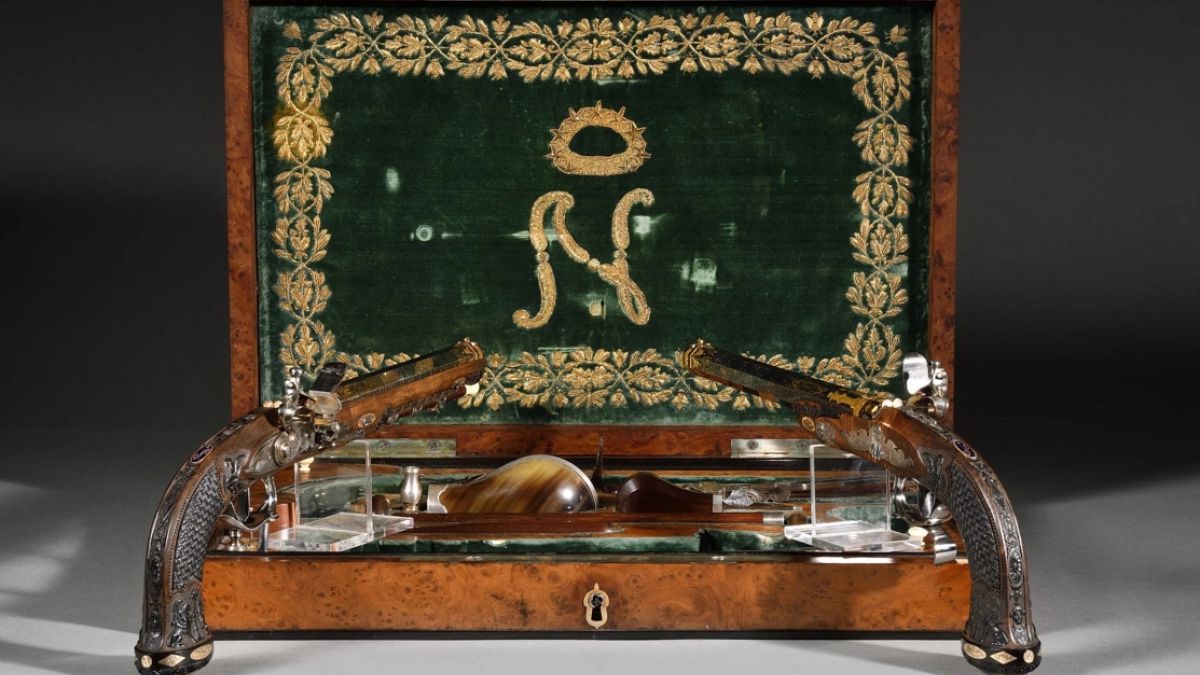A pair of detailed flintlock pistols, once owned by the French general Napoleon Bonaparte have sold for a €1.7 million (£1.4 million) at an auction in Fontainebleau, France. These Napoleon’s pistols are often referred to as the pistols that might have changed the course of history. The sale was conducted by the Osenat auction house, adjacent to the very palace where Napoleon contemplated using these weapons to end his life in 1814.

Also Read: 51,000-Year-Old Artwork Discovered in Indonesian Cave
In 1814, after a series of military defeats and the occupation of Paris by foreign forces, Napoleon’s morale was at an all-time low.
Facing the collapse of his empire, he seriously considered suicide. Napoleon’s closest ally, Armand de Caulaincourt played a crucial role in altering the course of history.
Aware of the general’s intentions, Caulaincourt removed the powder from Napoleon’s pistols rendering them inoperative and preventing the suicide of the French leader.
The Napoleon’s pistols was crafted by Paris gunsmith Louis-Marin Gosset and are known for their elaborate design.
They feature details including references to Greek gods, gold and silver inlays and an engraved image of Napoleon himself.
The weapons are preserved in excellent condition housed in their original box and accompanied by all accessories.
The box was made of Burr walnut with ebony inlay which has a lid lined with green velvet embroidered with the letter “N” and surrounded by embroidered flowers.
The Napoleon’s pistols were estimated to sell for between €1.2 million (£1 million) and €1.5 million (£1.27 million), but the final sale price exceeded expectations.
The identity of the buyer remains undisclosed. Due to their classification as national treasures by France’s culture ministry, the Napoleon’s Pistols cannot permanently leave France.
The French government has a 30-month window to make an offer to purchase the weapons from the new owner.
These Napoleon’s pistols were owned by Napoleon Bonaparte, the French emperor. Napoleon intended to use these weapons to commit suicide on April 12, 1814.
Napoleon’s grand squire, Armand de Caulaincourt prevented his suicide by removing the gunpowder from the pistols.
Following this, Napoleon attempted to take poison but survived. In gratitude Napoleon gifted the pistols to Caulaincourt.
The French culture ministry classified the Napoleon’s Pistols as national treasures. An export ban was placed on these items.
The government now has 30 months to make a purchase offer to the new owner, who retains the right to refuse.
Gun was created by Louis-Marin Gosset, a Parisian gunmaker. Napoleon’s pistols was adorned with gold and silver inlay. Featuring an engraved image of Napoleon in imperial attire.
Accompanying items had original decorative case. Various accessories including a powder horn and powder tamping rods.
Also Read: Aswan: Archaeologists Discover Over 1,400 Mummies in Egypt
The Napoleon’s pistols symbolize Napoleon’s lowest point. The auctioneer, Jean-Pierre Osenat addressed that the sale included not just the Napoleon’s Pistols but also a piece of history.
High demand for items associated with Napoleon among collectors. A bicorne hat worn by Napoleon sold for €1.9 million in a previous auction.
Following his defeat and abdication Napoleon was exiled to Elba, an island off the coast of Italy. Despite this, he made a return to France in 1815.
Napoleon’s return was short-lived, he was defeated at the Battle of Waterloo. He was exiled to the island of St Helena in the South Atlantic, where he died in 1821.
The French government has the opportunity to purchase these items preserving them as part of the national heritage.
This process involves negotiating with the current owner, who has the final say on any offer made by the government.
Much of what we know about Napoleon’s intention to commit suicide comes from the memoirs of Armand de Caulaincourt, published in 1933.
These memoirs provide an account of the events leading up to the night of 12 April 1814. Caulaincourt described Napoleon’s deep despair and his repeated contemplation of suicide.
The general had even ingested poison surviving the initial attempt but later seeking more poison, which he was denied.
On that night, Napoleon summoned Caulaincourt and expressed his wish to die. During moments of calm, Napoleon began distributing his possessions, instructing Caulaincourt to give his finest sabre and the pistols to himself as keepsakes.
Recognizing the danger, Caulaincourt removed the powder from the pistols, an act that altered the course of European history.
This intervention prevented Napoleon from taking his own life allowing him to live through the night and continue to influence events in the years that followed.
Napoleon went on to escape his exile on Elba, returning to France and briefly regaining power. His return led to the famous Hundred Days campaign culminating in his final defeat at the Battle of Waterloo in 1815.
Also Read: Israel: 3300-Year-Old Shipwreck Discovered























